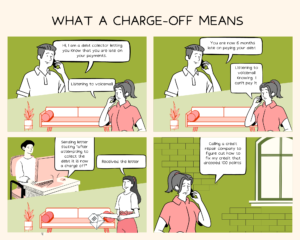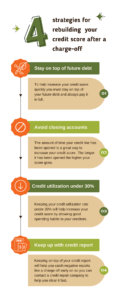What does a charge-off mean on a credit report?

Have you ever wondered what the charge-off entry means on your credit report? It may sound like your debt was taken care of, however that is far from the truth.
Learn what a charge-off means on your credit report and how you should handle it.
What is a charge-off?
A charge-off is a form of a write-off. This means that the creditor has given up on collecting the debt that you owe. However, this does not mean that your debt is forgiven.

If you notice that you have a charge-off debt on your credit report DO NOT IGNORE IT. Depending on the situation you may still be able to pay it off. Once you pay the debt off it will show up as a paid charge-off on your credit report.
When do charge-offs happen?
Charge-offs happen 6 months to a year after your last payment made on the debt. There are several negative consequences when you have a charge-off entry on your credit report. A few of them include,
- It is a derogatory mark on your credit report
- A lender may not accept your loan application when they see a charge-off
- This can damage your credit score
- It will remain on your credit report once sold to a collection agency for seven years.
What is a derogatory mark on my credit report?
A derogatory mark on your credit report is a negative item. This is something that we aim to keep off of our credit report. It can affect your credit score and make it harder to get any other loan.
Just as a charge-off on your credit report is a negative item so is,
- Missed payments
- Collections
- Repossession
- Foreclosure
Charge-off vs Collection
A charge-off can seem like a collection, but they do have their differences.
A collection is when the debt collector was not able to collect the debt that you owe. The creditor has now reported your debt as default. When this happens, they sell your debt to a third-party collection agency. It takes anywhere after 3 months for your creditor to report your debt as a collection.
Both are not a good thing to have on your credit report. A charge-off can be worse than a collection. With a charge-off, you usually have less wiggle room to negotiate the unpaid debt amount you owe and get it removed.
Both are always reported to the three credit bureaus; Equifax, Experian, and Transunion. Make sure to figure out your options immediately after seeing them on your credit report to avoid any judgments.
What is a judgment?
A judgment is a lawsuit filed against you by the creditor as a last attempt to get the money you owe. A judgment is usually the worst-case scenario when it comes to owing any debt. If you have received a judgment letter make sure to seek legal help.
How does a charge-off affect my credit report and credit score?
A charge-off impacts the credit score on three levels. It hurts the credit score because of
- Late payments
- The maxed out credit card lowers the score
- A past due balance on the credit report lowers the score.
Credit repair forums will tell you to dispute unpaid charge-offs to try to get them removed. This rarely ever happens and causes the creditor to start reporting new late payments every month as well as potentially triggering a lawsuit against you. Make sure you talk to a professional and get the correct information before making financial decisions
Like every negative mark on your credit report, a charge-off is not something you want to see. It will damage your credit score and can be a lengthy process to take care of. A charge-off can stay on your credit report for seven years even after you pay it off.
Paying it will not make things better overnight. A paid or unpaid charge-off will look bad to new creditors no matter what. While it is better to pay it than not pay it at all, it could still take many months for your credit score to improve.
A couple of things to keep in mind when looking to pay your charge-off account,
- You can bypass your account going into collections when you make payment arrangements.
- Once paid it will stay on your credit report but will change to a paid charge-off. While this can still look bad to other lenders, it does show that you are responsible and do pay your debts.
- You may also be able to negotiate the amount you owe for a lesser amount. This can be a complicated process and may need more legal help.
Rebuilding your credit after
It can take time and patience to build your credit score back up. There are many options to help you increase your credit score after a charge-off or collection report. The following options include,
- Stay on top of future debt by always paying in full.
- Avoid closing your accounts once paid off to keep a long open line of credit.
- Make sure to keep your credit utilization rate under 30%.
- Don’t hesitate to reach out to a credit repair company.
 How a debt specialist can help you!
How a debt specialist can help you!
It is important to keep up with your credit report. Keeping track of your credit report and credit score will help you catch negative marks like charge-offs and collections before they result in a judgment.
Speaking to a debt management or credit counseling company can have many benefits such as,
- Having a debt expert helps you understand your situation and options
- Have someone to fight for you against trained professional creditors
- Your debt specialist will make sure the creditor resolves the debt correctly.
- You will have someone to help you fight if you get sued.
If you have a charge-off or collections reported on your credit report, contact a debt specialist to hear about your debt relief options!

 How a debt specialist can help you!
How a debt specialist can help you!